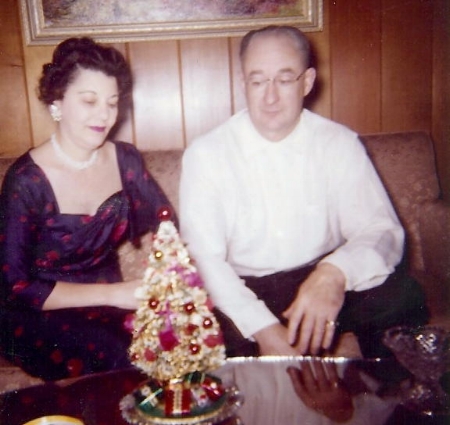Paul Walsh, man in motion
Paul Walsh at Evansville YMCA in 1978.
Wes Walker was fresh out of school and eagerly starting his new job at the YMCA in 1957 in Kankakee, Ill., when Paul Walsh was one of the first adult faces to greet him.
The place was full of kids, but there were only a couple dozen adults in the program, and one of the standouts was Paul, social, athletic and dedicated.
“Paul would go anywhere that there was a locker room and people to play sports with,” Walker said in 2007. “And the Y was it.”
Born Dec. 7, 1913 in Evansville, Ind., the year Ford Motor Co. introduced the moving assembly line, Paul was active and athletic throughout his 93 years. Even well into retirement, he swam, walked, and even worked under the house in the crawl space.
He graduated from Central High School in Evansville in 1932. Soon, he got a job with Servel, which during the 1930s and ’40s was the world leader in gas absorption refrigeration and a huge employer in Evansville.
Paul had lost a couple of finger tips as a mischievous youth when he tried to swipe some alcohol and had a window slammed on his fingers, so he didn’t serve in the military during World War II, but he likely contributed to the war effort through Servel, which in 1942 started production of wings for the P-47 "Thunderbolt." By 1944, Paul’s career was rolling along, and on March 25, he married his boss’ secretary, Lula Barnes, who had worked at Servel since the late 1920s.
In about 1946, their boss, Mark Scism, took a job in Kankakee and invited Paul and Lula to come along. It wasn’t easy, but after about a year, Scism finally persuaded Paul to take a job with David Bradley Manufacturing Co., a company that manufactured saws and lawn equipment for Sears.
Lula and Paul Walsh.
Paul worked for Scism for three or four more years, and they’d often socialize, sometimes visiting Chicago where Paul’s reluctance to spend money would show.
“My husband used to give him hell,” Marion Scism said in 2007. “Mark would get so mad because he’d buy a cheap ticket and it would be behind a pole.”
Mrs. Scism remembers going to see ice skater Sonja Henie from the Paul-purchased seats behind a pole. She remembers her husband’s response: “Walsh – he always called him Walsh – we don’t get to Chicago very often, so let’s spend some money.”
In the early 1950s, Scism was transferred to Pennsylvania. In 1966, Roper Corp. bought David Bradley and Paul worked for Roper until retirement.
In Kankakee, Paul was an active member of the YMCA. He played volleyball, one-wall handball and other sports. His house was on the Kankakee River, and he sometimes would start his day by paddling a canoe up the river, then tying it around his waist and swimming back.
“I don’t know any other person who does that because there’s quite a current,” said Bob North in 2007. “But Paul would do that.”
In about 1966, Paul had some heart issues, perhaps a mild heart attack. The medical community was divided in those days about how active one should be after heart issues. Some thought being active would only cause the heart to give out faster.
Paul believed otherwise. He wanted to stay active and build the heart muscle back up.
“Paul hunted around until he found doctors in the Cleveland Clinic who agreed with him,’’ remembered Walker, who had moved away for a few years in this era. “He was a pioneer in his belief. We all know that now. Paul was ahead of the curve on that.”
Paul dedicated himself to the YMCA, chairing the Building Committee for a new facility. He later called it his proudest achievement.
Ground was broken on the new building on April 27, 1967, and construction completed in 1968. A plaque at the Kankakee Area YMCA still bears the name Paul H. Walsh in recognition of his work.
When the new building opened, North remembers introducing the competitive Paul to four-wall handball, a sport he apparently had never played. North won handily.
“He said, ‘Phooey on this, let’s go back to one-wall,’” North remembered of Paul’s competitiveness.
In 1971, Roper transferred Paul to Williamsburg, Ky. He retired not long after, and Paul and Lula built a dream home on Kentucky Lake near Paducah.
“It was utopia,” Walker said.
Paul quickly made a friend who swam with him, but soon the friend decided to return to the workforce. The home was in the woods and somewhat remote for the highly social Paul and Lula.
“It really left Paul without a playmate,” said Walker, who often vacationed at Kentucky Lake. “Lu was really finding it tough to find places to shop and play bridge and golf. They were way back in the woods, so you had to really travel to get anywhere. Paul really wanted a locker room, the smell and the sweat.”
After three or four years, Paul and Lula returned to Evansville where they were social with the Eagles Club, tight with a dollar – during his memorial service after his Feb. 13, 2007 death Rev. Lynn Martin said, “He was frugal with a penny. As Lula said, ‘He could spend it five times.’” -- and, of course, active at the Y. Walker remembers interviewing for a job at the Evansville YMCA. Who did he run into?
Paul.
“They took advantage of everything that God gave them, the mind, the body, and they used them up,” Walker said. “They enjoyed life. They really did.”
Walker, about 20 years younger than Paul, treasures their time together: “A real character, and a person you say, I’m glad I knew him, that I lived my life without missing him.”

